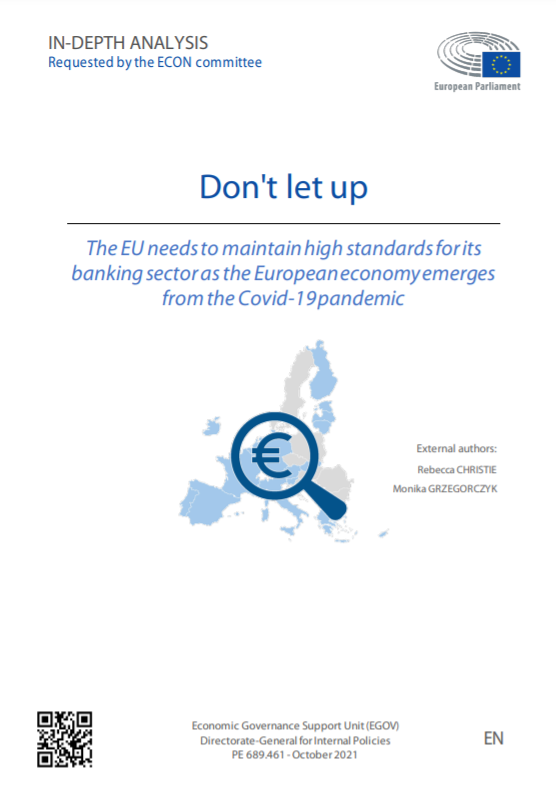Blog Post
Banking union vs. fiscal union and capture
Banking union is all the rage these days. There seems to be a general intellectual agreement that cutting the vicious feedback loop between banks and their respective sovereigns is one pressing matter (see Bruegel’s recent publications on the matter). There seems to be some convergence on the idea of (i) a supranational guarantee of deposits […]
Banking union is all the rage these days. There seems to be a general intellectual agreement that cutting the vicious feedback loop between banks and their respective sovereigns is one pressing matter (see Bruegel’s recent publications on the matter). There seems to be some convergence on the idea of (i) a supranational guarantee of deposits to avoid destabilizing bank runs, (ii) a supranational mechanism to resolve, restructure and recapitalize banks as well as (iii) the resulting supranational authority to regulate and supervise banks with the necessary intrusive powers centralized above national authorities.
Yet if these proposals are appealing on paper, they pose at least three essential political challenges that can easily be overlooked and come back with a vengeance:
The first one is to forget that behind the appearance of a discussion circumscribed to the banking sector, lies an essential question about burden sharing, and therefore fiscal transfers between member state. It is convenient to think of deposit guarantee scheme as an abstract commitment with liabilities only contingent on a very remote probability event. In reality however, structuring a real and effective supranational guarantee scheme will involve raising and diverting revenues that are now accruing to national budgets or national deposit guarantee schemes. In addition, member states will ultimately have to devise guarantees that involve very large notional amounts (totals euro area residents deposits are in the vicinity of 17 trillion euros, the deposits that are guaranteed are about 7 trillion euros today). Even though the probability of this being called upon is low, this is larger than any guarantee discussed for the introduction of Eurobonds for instance. A banking resolution authority would also be an authority that would ultimately take on financial risks in the context of a restructuring process and might incur losses that would be shared amongst the member states. This is in fact a fiscal risk sharing discussion through the backdoor.
The second challenge is that the resolution framework and supranational supervision both involve tearing apart very tight, intricate and sometimes incestuous relationships between banks, their supervisors and their sovereigns. Across Europe, banks entertain peculiar relationships with governments. In some countries, banks are perceived as the natural extension of the government’s arm to conduct economic and in particular industrial policy. In others, the regional organization of the banking system mimics that of the government and allows regional levels of government to secure financial backing and determine regional banks’ strategy. In others, local banks become an important player in local politics. In others yet, the legal organization of the banking system preserves the appearance of privately managed institutions while allowing considerable influence of the public sector on the conduct of day to day business as well as on strategic decisions. Finally, in all countries, the implicit sovereign backing allows for the supervisors to show clemency or be denied sufficiently intrusive powers. With a real supranational resolution framework and supervisory authority, capture and financial repression would be severely undermined.
The third is the consequence of a real banking union on the functioning of the single market for financial services. Indeed, if the euro area manages to create a real banking union, it is quite possible that it would establish a more profound divide between the euro area and the rest of the EU and in particular with the UK. This may distort the level playing field. Indeed, it is quite possible that a single market with two competing and equally complete banking unions would lead to regulatory arbitrages and potentially destabilizing incentives to undercut supervision, increase public sector guarantees or reduce bail-in provisions for instance. A banking union therefore would firmly raise the question of the integrity of the single market and increase the possibility of a two-speed Europe.
All in all, behind the apparent intellectual consensus, lie very fundamental disagreements. Yet in a functionalist tradition, a banking union that pools contingent banking sector related liabilities, would in fact force Europeans to launch a debate on the shape and form of a fiscal union and the pooling of actual and future sovereign liabilities. It would also help to reduce the incestuous relations between banks and their governments.
Republishing and referencing
Bruegel considers itself a public good and takes no institutional standpoint. Anyone is free to republish and/or quote this post without prior consent. Please provide a full reference, clearly stating Bruegel and the relevant author as the source, and include a prominent hyperlink to the original post.




















